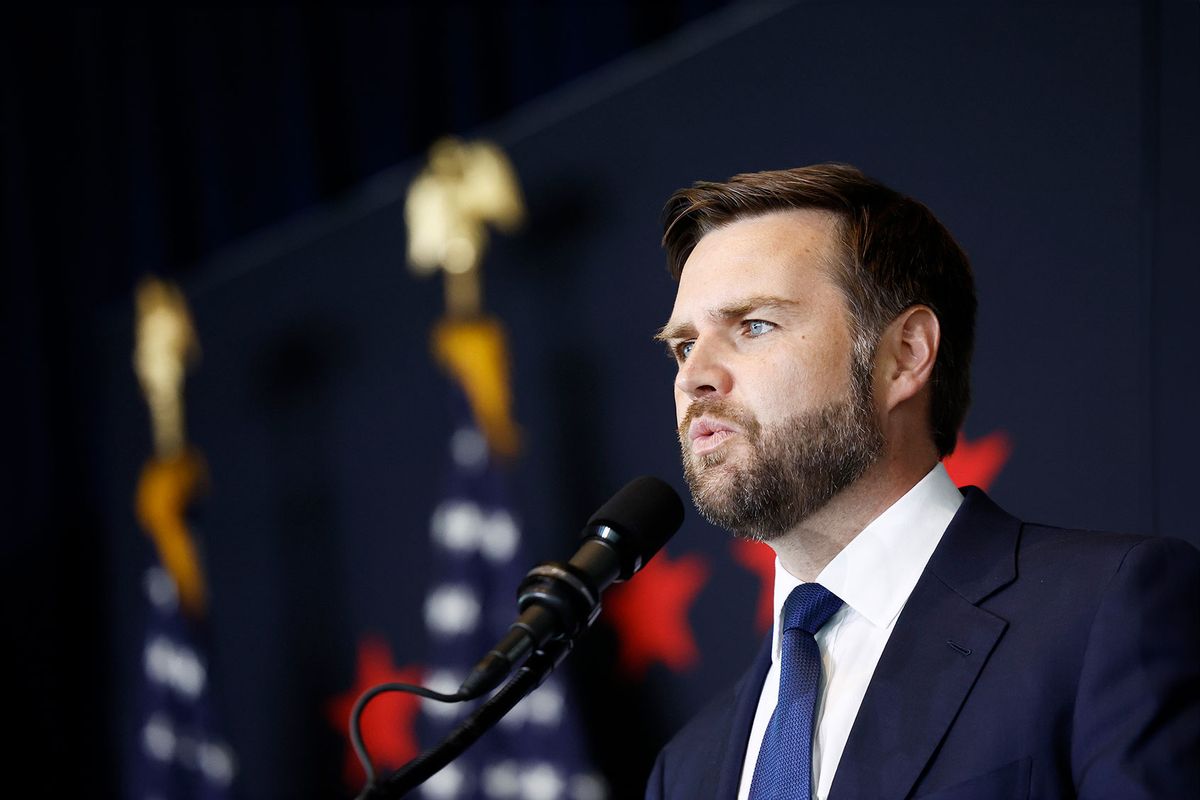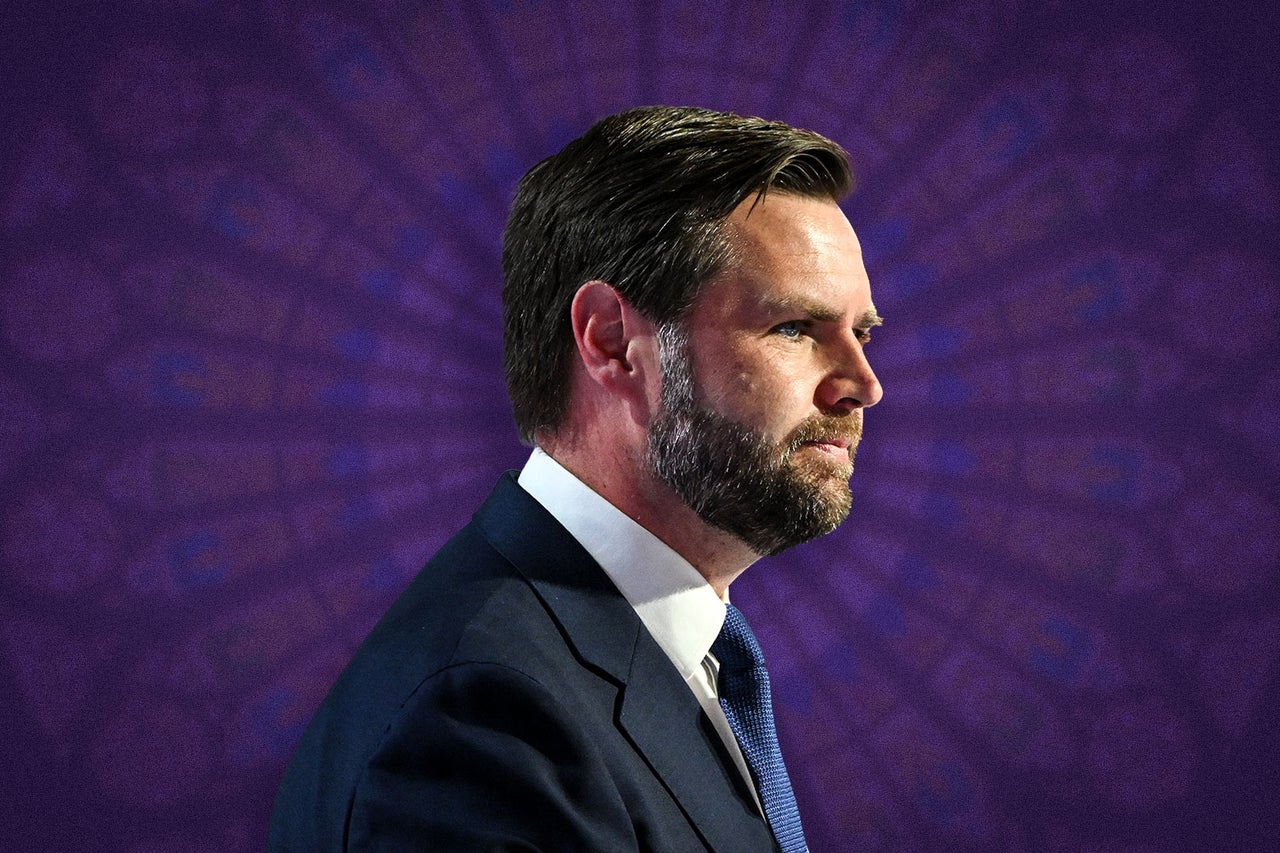- About last night’s Vice Presidential debate, and how Vance kept changing the subject;
- How Vance’s contempt for climate change science belies his purported concern for children, and reflects this recent Cory Doctorow column about marshmallow longtermism;
- How Vance’s conversion to a specific kind of Catholicism reveals his longing for a simpler, more structured past — in defiance of the classic liberal ideas of equality, personal liberty, and individual rights;
- And a final thought about how conservatism in general is about trying to change the subject, from the present to the past.
Last night was the Vice Presidential debate between JD Vance and Tim Walz. I thought it went well only in the sense that both men spoke fluently. I kept noticing the tendency by Vance to change the subject. He would be asked a question about, say, war in the middle east, and JD would say, It’s more important to talk about why Kamala Harris is responsible for all the spoiled food in your fridge, or something equally absurd. Kamala is to blame for everything, never mind she’s only vice president; whereas Trump for some reason isn’t responsible for all the things he promised (like the Wall) and didn’t get done *as president*. The most telling example of this, and the critical point of the debate, was this.

NY Times, Matt Flegenheimer: The Moment When Vance Dodged a Jan. 6 Question but Said Plenty, subtitled “JD Vance sailed fairly smoothly through some 90 minutes of Tuesday’s debate with Tim Walz. Then the subject turned to the Jan. 6, 2021, attack on the Capitol.”
Vance refused to say that Trump lost the 2020 election, or was responsible for Jan. 6th. Instead, he tried to change the subject: It’s more important to talk about Kamala Harris censoring conservative views about vaccines, by which he presumably meant attempts to quash lies and conspiracy theories about vaccines on social media. (I.e. “conservative views”.)
Also here:
NY Times, Ezra Klein: The V.P. Debate Came Down to One Moment, subtitled “JD Vance’s response to a question about challenging this year’s election results was telling”
The most consequential and revealing exchange during the vice-presidential debate on Tuesday came toward the end, when JD Vance was asked whether he would seek to challenge this year’s election results. That one moment proved that he can’t be trusted with the office he seeks.
Walz was quick on the uptake with Vance’s attempt to divert the topic.
“That,” Mr. Walz said, “is a damning non-answer.”
\\\
A couple more items about Vance.

Salon, Amanda Marcotte: JD Vance’s “weird science” hypocrisy: His climate change cleanup job shows a contempt for children, subtitled “JD Vance claims only parents care about ‘the future’ — but he called climate change ‘weird science'”
Marcotte reminds us how Vance hates childless cat-ladies and believes parents deserve special privileges in voting and taxes.
But at every turn during the vice presidential debate with Gov. Tim Walz of Minnesota, Vance showed that having three children has done diddly squat to make him care about the future. On the contrary, Vance repeatedly made it clear that his “pro-family” view is all rhetoric. In practice, he doesn’t care about actual children, either now or in the future.
That much was evident when Vance sneered that climate change is “weird science.”
When asked if he believes climate change is a hoax, as Trump does, Vance changed the subject. Of course. Marcotte’s concerns are about how Vance and conservative rhetoric is about control of women, not children per se, but what struck me was how his stance echoes that recent Cory Doctorow essay I linked recently, a month ago today in fact:
Cory Doctorow on Marshmallow Longtermism
Conservatives focus on short-term priorities and dismiss long-term threats. Even when those threats might affect their own children, and grandchildren.
\\
We’ve seen discussion of JD Vance’s religion before. Here’s another take.

Slate, Molly Oldmstead, 8 Aug 2024: J.D. Vance Used to Be an Atheist. What He Believes Now Is Telling., subtitled “He’s not an evangelical Christian. He’s a Catholic—of a very specific type.”
In 2021, when J.D. Vance was asked at a conference why he had converted to Catholicism just two years earlier, he had a fairly simple answer.
“I really liked that the Catholic Church was just really old,” he said.
Does this reflect the conservative longing for a lost golden age? Or the conservative longing for stability and discomfort with change? The writer considers these and other factors and finds a common theme.
In recent years, a sect of the Republican Party has boomeranged away from libertarianism and toward Big Government. A set of young legislators, including Vance, Marco Rubio, Tom Cotton, and Josh Hawley, is snubbing the party’s policies favoring tech companies and big business, instead infusing the GOP with populist energy—and, in some cases, disdain for the liberal political order. (Liberalism here refers to the dominant political order of the modern world, with its emphasis on equality, personal liberty, and individual rights.) Those legislators who identify with the postliberal right advocate for state authority in order to build the kind of society they want to live in. They aim to control women’s reproductive choices and individual freedoms concerning gender, sexuality, and identity; they prefer isolationist economic policies; they support unions and labor protections and oppose immigration; and they seek to elevate religious organizations’ place in their schools and civic institutions.
This echoes themes I’ve seen in other writers, and my own conclusion about how conservatives don’t actually believe in democracy (equality, personal liberty, individual rights) or even “limited government,” but prefer a kind of tribalistic authoritarianism. They’re perfectly happy with a big government that prescribes how they think everyone should live. The writer identifies the term”integralists” for intellectual Catholics with this worldview. And yes, it’s about the longing for the lost golden age.
The idea of forcing those values onto all of American society, through governmental policy, is what sets integralists apart from other traditionalist Catholics.
“It’s an idealization of the Middle Ages,” said Steven Millies, a professor of public theology at Catholic Theological Union in Chicago. As Millies sees it, the efforts among conservatives to push “classical education” in schools and the efforts by traditionalist Catholics to worship with Latin masses, in the style of 16th-century Catholics, come from the same impulse. “All these things are selective rereading of the past.”
This longing for an imagined simple past, Millies said, is something that has drawn cultural reactionaries to the faith for decades. “You gaze at stained-glass windows and Gothic architecture and you look at the orderliness of a 2,000-year-old tradition, and it looks like a rock to cling to in the torrents of modern life,” he said. “The present is disturbing to people. They feel unprepared for it, overwhelmed by it.”
\\\
And so it occurs to me that the entire conservative project is about changing the subject — about rejecting the modern world and trying to reinstall a simpler past. And they’ll use a big authoritarian government to do it, if they can.





